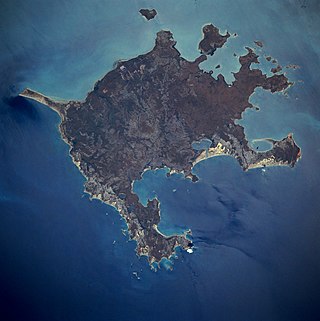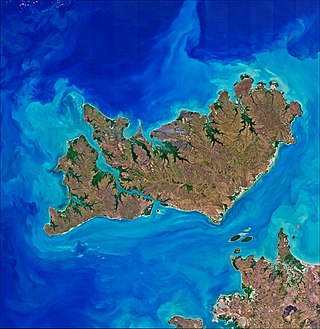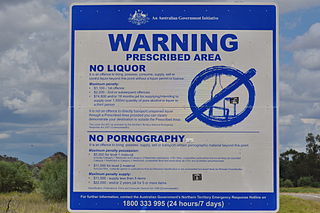Related Research Articles

Groote Eylandt is the largest island in the Gulf of Carpentaria and the fourth largest island in Australia. It was named by the explorer Abel Tasman in 1644 and is Dutch for "Large Island" in archaic spelling. The modern Dutch spelling is Groot Eiland.

Bathurst Island is one of the Tiwi Islands in the Northern Territory off the northern coast of Australia along with Melville Island.

Galarrwuy Yunupingu, also known as James Galarrwuy Yunupingu and Dr Yunupingu, was an Indigenous Australian activist who was a leader in the Aboriginal Australian community. He was involved in Indigenous land rights throughout his career. He was a Yolngu man of the Gumatj clan, from Arnhem Land in the Northern Territory. He was the 1978 Australian of the Year.

The Aboriginal Land Rights Act 1976 (ALRA) is Australian federal government legislation that provides the basis upon which Aboriginal Australian people in the Northern Territory can claim rights to land based on traditional occupation. It was the first law by any Australian government that legally recognised the Aboriginal system of land ownership, and legislated the concept of inalienable freehold title, as such was a fundamental piece of social reform. Its long title is An Act providing for the granting of Traditional Aboriginal Land in the Northern Territory for the benefit of Aboriginals, and for other purposes.

The Tiwi Islands are part of the Northern Territory, Australia, 80 km (50 mi) to the north of Darwin adjoining the Timor Sea. They comprise Melville Island, Bathurst Island, and nine smaller uninhabited islands, with a combined area of 8,320 square kilometres (3,212 sq mi).

Marion Rose Scrymgour is an Australian politician and the current member of parliament (MP) for the federal seat of Lingiari. She was a member of the Northern Territory Legislative Assembly from 2001 to 2012, representing the electorate of Arafura. She was the Labor Party Deputy Chief Minister of the Northern Territory from November 2007 until February 2009, and was the highest-ranked Indigenous Australian woman in government in Australia's history, as well as the first Indigenous deputy leader of an Australian government. She was also the first Indigenous woman to be elected to the Northern Territory legislature.
The Central Land Council (CLC) is a land council that represents the Aboriginal peoples of the southern half of the Northern Territory of Australia (NT), predominantly with regard to land issues. it is one of four land councils in the Northern Territory, and covers the Central Australia region. The head office is located in Alice Springs.
The Northern Land Council (NLC) is a land council representing the Aboriginal peoples of the Top End of the Northern Territory of Australia, with its head office in Darwin.
Angurugu is a community located on Groote Eylandt in the Northern Territory, Australia. The main spoken languages are Anindilyakwa, an Australian Aboriginal language, and English. Established as a Mission for the Church Mission Society, it is one of the three main indigenous settlements on the Groote Eylandt archipelago alongside Milyakburra and Umbakumba. According to the 2016 Census, the community had a population of 855, a decrease from 882 in 2006.

The Northern Territory National Emergency Response, also known as "The Intervention" or the Northern Territory Intervention, and sometimes the abbreviation "NTER" was a package of measures enforced by legislation affecting Indigenous Australians in the Northern Territory (NT) of Australia, which lasted from 2007 until 2012. The measures included restrictions on the consumption of alcohol and pornography, changes to welfare payments, and changes to the delivery and management of education, employment and health services in the Territory.

An Indigenous Protected Area (IPA) is a class of protected area used in Australia; each is formed by voluntary agreement with Indigenous Australians, and declared by Aboriginal Australians and Torres Strait Islander representative organisations. Each is formally recognised by the Australian Government as being part of its National Reserve System. The areas may comprise land and sea, and are managed by Indigenous groups for the conservation of biodiversity. Managing IPAs also helps to protect the cultural values of their country for future generations, and has benefits for Indigenous health, education, economic and social cohesion.
Land councils, also known as Aboriginal land councils, or land and sea councils, are Australian community organisations, generally organised by region, that are commonly formed to represent the Indigenous Australians who occupied their particular region before the arrival of European settlers. They have historically advocated for recognition of traditional land rights, and also for the rights of Indigenous people in other areas such as equal wages and adequate housing. Land councils are self-supporting, and not funded by state or federal taxes.
The Tiwi Land Council is a land council in the Northern Territory of Australia established in 1978 to represent Aboriginal Australians living on the Tiwi Islands. It is one of four land councils in the Northern Territory.
Commonwealth, State, and Territory Parliaments of Australia have passed Aboriginal land rights legislation.
In Australia, Indigenous land rights or Aboriginal land rights are the rights and interests in land of Aboriginal Australians and Torres Strait Islander people; the term may also include the struggle for those rights. Connection to the land and waters is vital in Australian Aboriginal culture and to that of Torres Strait Islander people, and there has been a long battle to gain legal and moral recognition of ownership of the lands and waters occupied by the many peoples prior to colonisation of Australia starting in 1788, and the annexation of the Torres Strait Islands by the colony of Queensland in the 1870s.
In Australia, an Aboriginal land trust (ALT) is a type of non-profit organisation that holds the freehold title to an area of land on behalf of a community of Aboriginal Australians. The land has been legally granted to a community by the government under a perpetual lease, usually after the community makes a formal claim of traditional ownership. Land granted under Aboriginal title is inalienable; it can not be bought, sold, traded or given away. The land trust is the organisation appointed by the community to legally hold the title deeds. The land trusts are administered by Aboriginal land councils.
Vernon Islands Conservation Reserve is a protected area in the Northern Territory of Australia located in the locality of Vernon Islands about 50 kilometres (31 mi) north-east of the territory capital of Darwin.

Vernon Islands, also known as the Potinga Islands, is an island group in the Northern Territory of Australia located in the Clarence Strait about 55 kilometres (34 mi) north-east of the territory capital of Darwin. The group consists of three islands which were first sighted by Europeans in 1818 on a British navy ship under the command of Phillip Parker King. The group were part of the subject of a successful aboriginal land claim which was resolved after 40 years in 2018 when the Tiwi people received title. All three islands host navigation aids which assist vessels passing through the Clarence Strait. It and some adjoining seabed have had protected area status since 1974 and which has been known as the Vernon Islands Conservation Reserve since 1979. Since 2007, the island group has been located in the locality of Vernon Islands.
Anindilyakwa is a locality on Groote Eylandt, in the Northern Territory, Australia, located about 629 kilometres (391 mi) east of the territory capital of Darwin.
The Anindilyakwa Land Council (ALC) is a land council that represents the Anindilyakwa people of the Groote Archipelago in the Top End of the Northern Territory of Australia. It is one of four land councils in the Northern Territory. The head office is located in Alyangula.
References
- ↑ Government, Northern Territory (24 May 2022). "Land council roles and contacts". nt.gov.au. Retrieved 11 September 2024.
- ↑ "About Us". Anindilyakwa Land Council. Retrieved 11 September 2024.
- ↑ "Who we are". Central Land Council. Retrieved 11 September 2024.
- ↑ "About Us | Northern Land Council NLC". www.nlc.org.au. Retrieved 11 September 2024.
- ↑ "Tiwi Land Council | TLC History". www.tiwilandcouncil.com. Retrieved 11 September 2024.
- ↑ "Aboriginal Land Rights (Northern Territory) Act 1976". Federal Register of Legislation. Australian Government. 16 December 1976. Retrieved 11 September 2024.
- ↑ "Audit Report - Northern Territory Land Councils and the Aboriginals Benefit Account". 17 July 2005. Archived from the original on 17 July 2005. Retrieved 11 September 2024.
- ↑ "Social Justice Report 2007 - Chapter 3: The Northern Territory 'Emergency Response' intervention | Australian Human Rights Commission". humanrights.gov.au. Retrieved 11 September 2024.